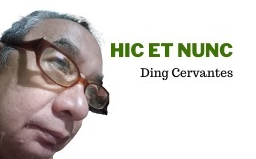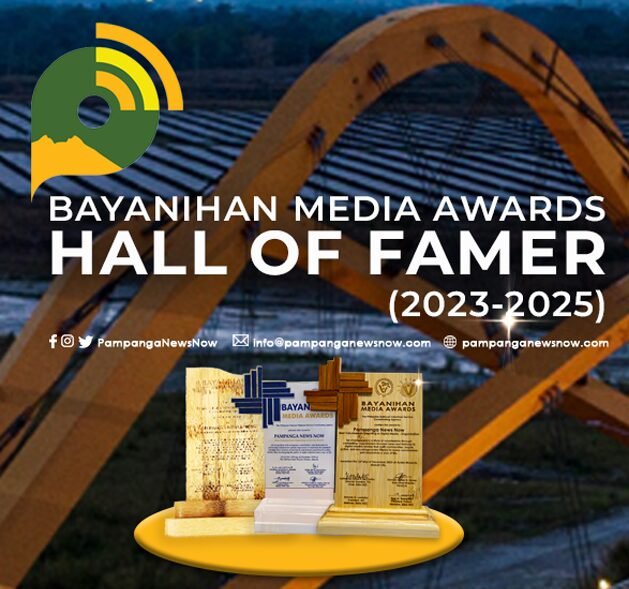
Imagine living where a neighbor does almost nothing but croak loudly – at decibels that rattle French windows – over non-stop karaoke singing, breaking fast early morning thru past Dracula’s dawn coffin time.
Such has been my sorry state at home, across from a lot that hosts a house sheltering assorted boarders and bed spacers, as well as a three-unit apartment that find children’s birthday parties justifications for drinking sprees. And, yes, for karaoke caterwauling.
The option, of course, is to seek legislation underscoring loud karaoke as noise pollution and therefore illegal.
I wrote one such appeal and coursed it through the Facebook account of Mabalacat City Vice Mayor Geld Aquino who presides over the city legislature, but many weekend laundromat sorties have come and gone with nary a word from him.
So here I am sharing contents of the letter in the hope of some reaction of the positive kind.
The letter said:
May I urgently propose a legislation unfortunately overlooked in our city, as elsewhere: that of banning the use of loud karaoke (videoke and other such machines) in these times of coronavirus pandemic.
I live in Barangay Lakandula, across from a neighbor who hosts apartments for rent as well as transient boarders who are fond of hiring karaoke machines for ear-splitting birthday vociferations.
Surely, your honors have heard of serious conflicts, even killings, arising from such reckless vocal blasts regardless of sunrises and sunsets, a sad situation that is my predicament, as my home consists of a 98-year-old mother and three orphaned nieces attending distance learning classes.
Regardless of my personal predicament, please let me point out other serious justifications for banning loud karaoke as well as other such machines as follows:
In October, 2020, Interior Sec. Eduardo Ano “encouraged local government units to pass ordinances that would ban videoke sessions and other loud activities that can hamper online classes of students. He was quoted to have said: “Bilang mga disiplinado at responsableng mga magulang at mamamayan, tulungan natin ang ating mga estudyante na mabigyan ng tahimik at payapa na kapaligiran para sila ay makapag-aral ng mabuti sa kani-kanilang mga tahanan.”
As matter of fact, Ano also told local government units to “also prohibit other noisy activities including ‘tupada, bingo, betting stations, and drinking sprees’ to avoid disturbing students.”
He also urged motorists to avoid unnecessary blowing of horns during school hours which can distract learners in the neighborhood.
Loud videoke also touches the sensitive nerve of health. Allow me to quote sciencedaily.com on whether singing, especially loudly, or even talking loud can help spread Covid-19, as it cited aerosol researchers at the Lund University in Sweden:
“They have studied the amount of particles we actually emit when we sing — and by extension — if we contribute to the increased spread of Covid-19 by singing.
“There are many reports about the spreading of Covid-19 in connection with choirs singing. Therefore, different restrictions have been introduced all over the world to make singing safer. So far, however, there has been no scientific investigation of the amount of aerosol particles and larger droplets that we actually exhale when we sing,” says Jakob Löndahl, associate professor of Aerosol Technology at Lund University.
“Aerosols are small airborne particles. To get a better understanding of the amount of aerosols and virus particles we actually emit when we sing, 12 healthy singers and two people with confirmed Covid-19 took part in a research project. Seven of the participants were professional opera singers.
“The study shows that singing — particularly loud and consonant-rich singing — spreads a lot of aerosol particles and droplets into the surrounding air.
“Some droplets are so large that they only move a few decimetres from the mouth before they fall, whereas others are smaller and may continue to hover for minutes. In particular, the enunciation of consonants releases very large droplets and the letters B and P stand out as the biggest aerosol spreaders,” says Malin Alsved, doctoral student of Aerosol Technology at Lund University.
“During the research experiments at Lund University’s Aerosol Laboratory, the singers had to wear clean air suits and enter a specially built chamber supplied with filtered, particle-free air. In the chamber, analysis was conducted of the number and mass of particles emitted by singers during breathing, talking, different types of singing and singing with a face mask.”
Indeed, I have observed that hiring karaoke machines for birthday occasions are attended by guests from other areas, all taking turns at singing, unmindful of face masks and social distancing… karaoke parties invite violation of anti-pandemic protocols.
Lastly, may I share concern over the noise pollution arising from loud videoke singing undoubtedly constituting noise pollution.
There is common agreement that noise pollution affects both health and behavior. ScIentists have no doubt that unwanted sound (noise) can damage psychological health. Noise pollution can cause hypertension, high stress levels, tinnitus, hearing loss, sleep disturbances, and other harmful effects.
“Sound becomes unwanted when it either interferes with normal activities such as sleeping, conversation, or disrupts or diminishes one’s quality of life,” a science journal warned.
Experts have concluded that “high noise levels can result in cardiovascular effects and exposure to moderately high levels during a single eight-hour period causes a statistical rise in blood pressure of five to ten points and an increase in stress, and vasoconstriction leading to the increased blood pressure noted above, as well as to increased incidence of coronary artery disease.”
If I may urge your honors to access scientific websites on Google which will reveal more conclusive studies on the effects of noise, especially on young students who are already burdened by serious shortcomings in the so-called long distance learning scheme of the education department.
A law against loud karaoke or similar devices can be effective only with penalties, such as confiscation of the machine used, for retrieval only after payment of significant sum, and empowering barangays to implement the ordinance.
I am hoping that your honors will find not only good reason to consider an ordinance banning the use of loud karaoke and similar machines, but also the urgency to do so amid another pending school year of long distance learning. May I suggest that, as an added safeguard, owners of boarding houses be barred from allowing loud karaoke and similar machine access to their tenants.
This is not to totally ban the use of karaoke and similar machines, but only when there is guarantee that they would not cause noise pollution, such as in an enclosed space.
Thus ended the missive.



